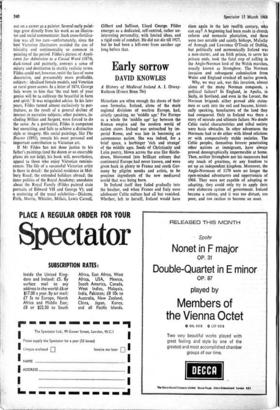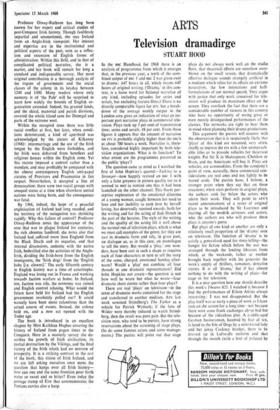Early sorrow
DAVID KNOWLES
A History of Medieval Ireland A. J. Otway- Ruthven (Ernest Benn 70s) Historians are often enough the slaves of their own formulas. Ireland, alone of the main regional divisions of western Europe, had, strictly speaking, no 'middle age.' For Europe as a whole the 'middle age' lay between the Roman empire and the modem world of nation states. Ireland was untouched by im- perial Rome, and was late in becoming an autonomous nation. She was indeed, for a brief space, a harbinger 'rich and strange' of the middle ages. Seeds of Christianity and Latin poetry, blown across the seas like thistle- down, blossomed into brilliant colours that continental Europe had never known, and were given back in plenty to France and south Ger- many by pilgrim monks and artists, to be precious ingredients of the new mediaeval world that was being born.
In Ireland itself they faded gradually into the heather, and when France and Italy were adolescent Celtic culture had all but vanished. Whether, left to herself, Ireland would have risen again in the late twelfth century, who can say? A beginning had been made in church reform and monastic plantation, and there were two notable and saintly bishops, Malachy of Armagh and Lawrence O'Toole of Dublin, but politically and economically Ireland was a non-starter, and an Irish prince, to serve his private ends, took the fatal step of calling in the Anglo-Norman lord of the Welsh marches, usually known as Strongbow. The Norman invasion and subsequent colonisation from Wales and England crushed all native growth.
Why, we may ask, was this invasion, almost alone of the many Norman conquests, a political failure? In England, in Apulia, in Sicily, in Scotland, and even in the Levant, the Norman brigands either proved able states- men or sank into the soil and became, histori- cally speaking, benefactors of the land they had conquered. Only in Ireland was there a story of misrule and ultimate failure. No doubt Celtic racial characteristics and tribal society were basic obstacles. In other adventures the Normans had to do either with blood relations or with comparatively stable societies. The Celtic peoples, themselves forever penetrating other nations as immigrants, have always proved demographically impermeable at home. Then, neither Strongbow nor his successors had any touch of greatness, or any freedom to set up an independent kingdom. Moreover, the Anglo-Normans of 1170 were no longer the open-minded adventurers and opportunists of 1066. They were not capable of adopting or adapting; they could only try to apply their own elaborate system of government. Ireland became a colony, and it was too distant, too poor, and too restless to become an asset
Professor Otway-Ruthven has long been known for her expert and critical studies of post-Conquest Irish history. Though faultlessly impartial and unemotional, she sees Ireland from an Anglo-Irish viewpoint. Her interest and expertise are in the institutional and political aspects of the past, seen as a reflec- tion and extension of English forms of administration. Within this field, and in that of complicated political narrative, she is a master, and her book will remain for long a standard and indispensable survey. Her most original contribution is a thorough analysis of the organs of government and the social classes of the colony in its heyday between 1240 and 1300. Many readers whose only memory is of 'the Pale' will be surprised to learn how widely the bounds of English or- ganisation extended. Indeed, the granted lands, and the shiral, manorial and parish divisions, covered the whole island save for Donegal and parts of the extreme west.
Within the occupied zone there was little racial conflict at first, but later, when condi- tions deteriorated, a kind of apartheid was acknowledged by the statute of Kilkenny (1366): intermarriage and the use of the Irish tongue by the English were forbidden, and the Irish were debarred from benefices and religious houses within the English zone. Yet this statute imposed a control rather than a mandate, and may profitably be compared with the almost contemporary English anti-papal statutes of Provisors and Praemunire in this respect. Nevertheless, it accepted a line of demarcation; there were two racial groups with unequal status at a time when elsewhere united nations were being born, and the consequence was fatal.
By 1366, indeed, the hope of a peaceful anglicisation of Ireland had long receded, and the territory of the occupation was shrinking rapidly. Why this failure of control? Professor Otway-Ruthven notes the appearance of the sore that was to plague Ireland for centuries, the rich absentee landlord; she notes also that Ireland had suffered more than England from the Black Death and its sequelae, and that internal dissensions, endemic with the native Irish, bedevilled also the activities of the Anglo- Irish, dividing the Irish-born from the English immigrants, the 'Irish dogs' from the 'English hobs [i.e. clowns].' The early fifteenth century in English history was a time of catastrophe.
England was losing out in France and working towards faction warfare at home. In Ireland, too, faction was rife, the economy was ruined and English control relaxing. What would the future have held for Ireland had the English government resolutely pulled out? It could scarcely have been more calamitous than the actual course of events. Instead, the colony held on, and a new act opened with the Tudor age.
The book is introduced in an excellent chapter by Miss Kathleen Hughes covering the history of Ireland from pagan times to the Conquest. Here in a masterly survey she de- scribes the growth of Irish civilisation, its partial destruction by the Vikings, and the final victory of the Irish which had no morrow of prosperity. It is a striking contrast to the rest of the book, this vision of Irish Ireland, and we are left asking ourselves once more the question that hangs over all Irish history— how can one and the same fountain pour forth water so sweet and so bitter? Even today the postage stamp of Eire that commemorates the Fenians carries also a harp.











































 Previous page
Previous page